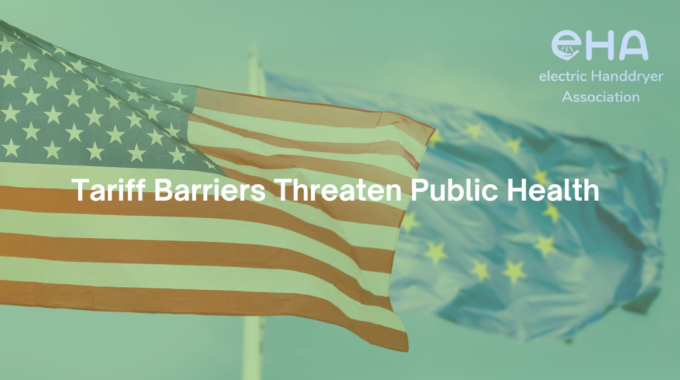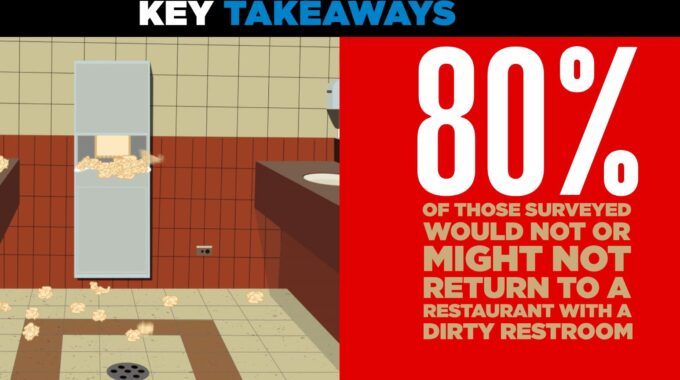New Global Trends in Commercial Restroom Design: Enhancing User Experience, Health, Sustainability and Savings.

Why Tariff Barriers Threaten Public Health
Protecting Clean Innovation: Why Tariff Barriers Threaten Public Health, Climate Goals, and Global Competitiveness
Executive Summary
As electric hand dryers increasingly prove their value across the world — improving hygiene, reducing operational costs, and drastically cutting carbon emissions — fair and open trade policies are essential to sustaining this momentum. The recent tariff agreement between the EU and the United States is a welcome step in the right direction, recognizing the importance of clean technologies and facilitating access to innovative public health infrastructure.
However, global progress remains uneven. Tariffs and regulatory barriers in other jurisdictions still threaten to reverse advances in hygiene, sustainability, and innovation. The Electric Hand Dryer Association (eHA) therefore calls on policymakers worldwide to:
- Ensure that electric hand dryers and similar clean technologies benefit from tariff-free trade,
- Promote free and fair trade for hygienic infrastructure solutions,
-
Align trade policy with climate, health, and innovation goals.
The Stakes: What Tariffs on Electric Hand Dryers Really Mean
Electric hand dryers, such as the XLERATOR® with HEPA filtration, are no longer “nice-to-have” gadgets — they are essential public infrastructure in high-traffic environments like airports, hospitals, and schools. The Istanbul Grand Airport’s case demonstrates:
- Up to 95% operational cost savings,
- 94% lower carbon footprint compared to paper towels
- Enhanced hygiene, reducing virus and bacteria spread.
Where tariffs persist on these products or their components, they:
- Drive up costs for public institutions and private operators,
- Delay adoption of safer, more sustainable solutions,
- Encourage continued use of wasteful alternatives like paper towels.
A Turning Point: Does U.S.–EU Tariff Agreement Signals Progress?
The new trade understanding between the United States and the European Union offers a positive model – at least it seems to establish reliable structures. By reducing or eliminating tariffs on clean and efficient technologies, both economies are affirming the role of trade policy in supporting climate and health outcomes. This deal sets a precedent for:
- Making advanced technologies more affordable and accessible,
- Strengthening transatlantic supply chains and innovation ecosystems,
- Reinforcing international trust in regulatory cooperation on sustainability.
Yet outside this agreement, similar technologies remain subject to harmful protectionist policies elsewhere. A consistent global approach is still needed.
The Global Opportunity: What a Tariff-Free Future Enables
Instead of raising barriers, trade policy should accelerate the global rollout of electric hand dryers by:
- Removing tariffs on key sustainability-enabling technologies,
- Streamlining customs and regulatory compliance for certified products,
- Encouraging international collaboration in hygiene and climate tech.
Airports like iGA offer replicable examples of how such technologies contribute to public health and carbon reduction — but only if global trade systems remain open, transparent, and predictable.
eHA Recommendations for Policymakers
Expand on the U.S.–EU model and declare zero tariffs globally on electric hand dryers and certified hygienic infrastructure products.
- Include electric hand dryers in “green goods” trade agreements under WTO environmental goods initiatives.
- Avoid unilateral tariff increases that block innovation and climate-aligned technologies.
- Support international regulatory alignment for cross-border acceptance of high-quality hand-drying technologies.
Conclusion
The new EU–U.S. tariff agreement could become a blueprint for progress. It shows how smart trade policy can support public health, economic competitiveness, and climate resilience. But clean innovation must not stop at transatlantic borders. The eHA urges governments around the world to replicate and expand such agreements, removing barriers that block access to efficient, hygienic solutions. Let clean innovation dry hands, not be tied up in red tape and tariffs.


